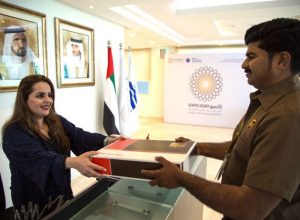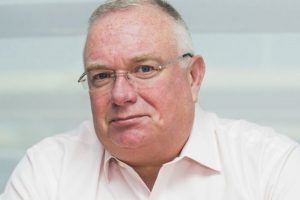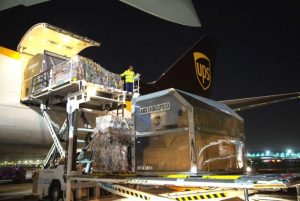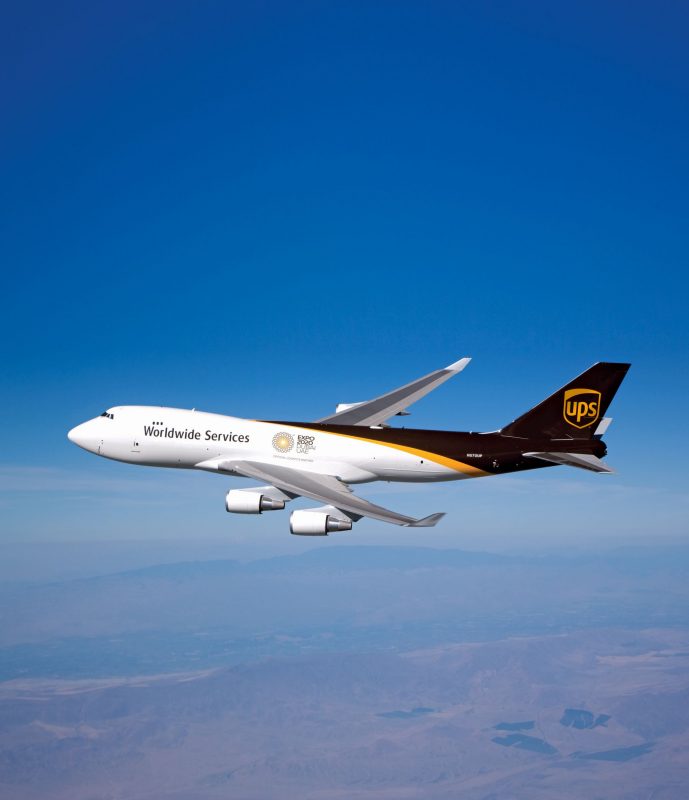UPS Enabling growth across borders
Our job is a big one: We’re here to help businesses connect with the many growth opportunities in the region. You could call us trade enablers, I suppose, as we connect the Middle East to China and wider Asia well as Europe with what you’ll hear more people at UPS refer to as our “smart global logistics network.
-Jean-Francois Condamine, UPS President of Indian Subcontinent, Middle East and Africa
“Most people don’t know that at any given moment on any given day, there is a UPS plane in the sky. Our smart global logistics network is always moving for UPS customers.” – Ismet Demirel, UPS Network Development & Procurement Manager, ISMEA
In 2017, UPS received about 142.8 million tracking requests in a single business day peaking at 275.4 million, the company disclosed.
That’s a staggering number but not quite surprising as the US-based cargo carrier and logistics company accounts for move approximately 3 percent of the world’s GDP through its smart global logistics network on a daily basis with its fleet of 581 aircraft and 2,242 flight segments connecting779 destinations in over 220 countries and territories worldwide.
In Dubai, the regional hub of UPS in the Indian Subcontinent, Middle East and Africa (ISMEA), which since inception in 2013, had seen a double-digit growth with potential for more with business activities steadily increasing in the region, at least 42 UPS brown tail flights per week are dispatched at the Dubai International Airport (DXB).
Jean-Francois Condamine, UPS President of ISMEA, told Air Cargo Update, UPS has actually been in the region since 1989 first opening up offices in the oil-rich Nigeria and the trade-friendly India. It decided to increase its presence in recent years. And Dubai, as the financial and logistics hub in the Middle East, was an obvious choice for UPS regional headquarters given its proximity to connect to Africa, Asia and Europe within just a matter of hours.

“UPS has been here in the region since 1989. We decided on Dubai as the headquarters for our Indian Subcontinent, Middle East and Africa business that we at UPS simply refer to as “ISMEA.” It’s our largest region in terms of geography – we have over 70 countries in which we operate,” said Condamine who has been with UPS since 1991 after the company he used to work for, the French package firm Prost Transport, was acquired by the American cargo carrier.
“The decision to choose Dubai wasn’t all that difficult for us. We’re a logistics company so when you consider that 2/3 of the world is within an 8-hour flight from here, Dubai made sense. And our office actually sits within the free economic zone in the Jebel Ali area at the far western end of Dubai. It’s more than just symbolic,” he added.
The ‘trade enablers’
Working his way through school in France by delivering packages, Condamine takes the business seriously and likened their roles at UPS as “trade enablers” facilitating businesses and help creating jobs in a wide spectrum of industries.
“Global trade is in our veins at UPS – we move 3% of the world’s GDP every day so it’s only fitting that we come to work every day in a trade hot spot that gives direct access to a market of over 2 billion people. Our job is a big one: We’re here to help businesses connect with the many growth opportunities in the region,” said Condamine who has a Master’s in Economics from the Université de Reims in 1984.
“You could call us trade enablers, I suppose, as we connect the Middle East to China and wider Asia as well as Europe with what you’ll hear more people at UPS refer to as our ‘smart global logistics network.’ We plug in small companies and can help them scale and grow. And, of course, we work with every size of company right up to the largest of the multinationals.
“Regardless of size, there is something that these companies have in common: They are increasingly seeking growth across borders. You simply can’t do that without world-class logistics. UPS’s expansion strategy is rooted in helping its customers meet their local, regional and global ambitions.”
Ismet Demirel, UPS Network Development & Procurement Manager, ISMEA, adds growth is very much visible that the company decided to allot one of its 14 newly ordered Boeing 747-8 cargo planes to the region.
 The new plane would mean a day faster in terms of transporting goods between Dubai and the United States.
The new plane would mean a day faster in terms of transporting goods between Dubai and the United States.
“When you ask someone about growth, it’s often measured in numbers. So it’s actually pretty fun to count growth in airplanes in our business. We have just announced that UPS ordered 14 more Boeing 747-8 cargo jets to provide additional capacity in response to accelerating demand for our air services,” Demirel shared. “I couldn’t be happier to say that one of these planes – the biggest that UPS has ever flown – has just been allocated to a new daily non-stop flight to Dubai from the U.S. – this is in addition to a flight to Dubai that comes out of our European hub in Germany. The new flight comes from Worldport, our global air hub in Louisville, Kentucky straight to Dubai.”
The UPS executive said this would mean faster service for their customers in the region which would help them realize more business.
“That’s exciting for us because we have new planes coming into our fleet. But it’s much more interesting to our customers spanning from North and South America whose goods can now reach the UAE an entire day faster. Global trade waits for no one, as our customers know. So we’re already helping customers reach this high growth region more quickly for amazing B2B opportunities that come from serving businesses here in full expansion mode,” said Demirel.
Elsewhere in the region, Demirel shared UPS also inaugurated a new airside facility at the Mohammed V International Airport in Casablanca in Morocco where it also launched a chartered flight dedicated to UPS volume from the company’s European hub in Germany to Morocco.
“Here again, we are improving time-in-transit by 24 hours. Morocco serves as a gateway to Africa for Europe to reach 1 billion consumers – that’s 60 percent of the world’s GDP. Improvement and expansion of our smart global logistics network remains a strategic focus for UPS’s and our customers’ growth,” explained Demirel.
Expo 2020 Logistics Partner
With billions invested in new infrastructure in the UAE in recent years in anticipation of the more than 20 million tourists expected to flock to Dubai in less than two years for the much awaited Expo 2020, a reliable way of moving things on time and efficiently are crucial in making the six-month event an unforgettable experience for participants who will stay and visit the country.
UPS knows that too well and it had since agreed to become the event’s official logistics partner.
The UPS President for ISMEA described the upcoming event as having complex logistics projects but one that UPS is familiar with having participated in several high profile global events in the past.
“With more than 180 countries participating and millions of people visiting, Expo 2020 will be one of the most complex logistics projects UPS has tackled, encouraging it to rely on expertise gained as logistics sponsor in the 2012 Olympic Games in London and the 2008 Olympic Games in Beijing. An undertaking of this scale and sophistication requires a next generation network that is smart, efficient and integrated,” said Conamide.
 “UPS is proud to share Expo 2020’s vision; “Connecting Minds, Creating the Future,” and three pillars: Sustainability, Opportunity and Mobility. For example, we have more than a decade of experience in solar energy and about a year ago announced plans to increase our investment in solar power, starting with at least eight UPS facilities in the U.S. We are passionate about adopting alternative fuel for our fleet, including hybrid and electric vehicles. Additionally, we have immense experience in enabling commerce around the globe, connecting and serving 220 countries and territories, which allows us to play a key role in the theme of mobility,” he stressed.
“UPS is proud to share Expo 2020’s vision; “Connecting Minds, Creating the Future,” and three pillars: Sustainability, Opportunity and Mobility. For example, we have more than a decade of experience in solar energy and about a year ago announced plans to increase our investment in solar power, starting with at least eight UPS facilities in the U.S. We are passionate about adopting alternative fuel for our fleet, including hybrid and electric vehicles. Additionally, we have immense experience in enabling commerce around the globe, connecting and serving 220 countries and territories, which allows us to play a key role in the theme of mobility,” he stressed.
Fast forward after Expo 2020, the UPS executive disclosed the company has bigger plans to make the UAE’s vision of business connectivity going.
“We are excited to play a key role in connecting people, goods and ideas, and providing easier access to markets, knowledge and innovation through its partnership with Expo 2020 that will last long after April 2021. We share a vision with the UAE of what the logistics of tomorrow will look like and are honored to be on the front line of change,” he said.
“I spoke about the past but let me tell you about the future: We plan to expand our presence in the region by establishing capacity, technology and staff capabilities to serve customers shipping to and through Dubai – well after Expo 2020 sees its last visitors. We certainly share Expo 2020 Dubai’s views on sustainability and will contribute to the legacy of this historical undertaking by continuing to plan for the future,” he noted.
Jean-François Condamine, the President of UPS Indian Subcontinent, Middle East, and Africa (ISMEA) region, is highly regarded for his astute business acumen and concern for people who run the establishment.
When UPS tapped him in 1990 to restructure Prost Transportation which the firm acquired, he managed to grow it to 61 offices across France securing jobs for 2,000 more people.
In 2013, the French executive was again tapped to take on another challenge—to lead UPS’s headquarters in the region in Dubai. Today, UPS ISMEA deals with 70 high-growth markets dispatching as many as 42 brown tail planes out of Dubai to different countries in the region.
Condamine shares more of his insights with Air Cargo Update in an email interview.
What were some of the challenges you encountered when you first set up UPS here?
The ISMEA region has long been a key market for UPS and eyed carefully for expansion. I mentioned that UPS was first established in the region in 1989, setting up in Nigeria and India. Back in 2013 when we designated Dubai as the new regional headquarters, the big challenge UPS faced when we initially moved into this part of the world was the size of the region. This is a big region for UPS. We had to bridge time zones, cultures, distances and languages over such a large landscape. We have rapidly expanded and cemented our presence in Africa by implementing a “4 corners” strategy to ensure seamless coverage across the continent. This is important for customers who expect us to meet their needs by providing UPS’s level of service over a wide area.
We have achieved this by strengthening our partnerships with leading logistics providers to operate a comprehensive network of Authorized Service Contractors. We are able to combine UPS’s global reach with expert local knowledge. Today, UPS serves 104 airports in ISMEA and operates 42 UPS brown tail flights per week through Dubai International airport. I think Dubai’s reputation as a key node in the global trade game is pretty well cemented!
While setting up in the region UPS also needed to actively focus on integrating markets and employees across this large landscape. We quickly leveraged the company’s “One UPS, One World” initiative to make connections and drive the development of a comprehensive enterprise-wide diversity and inclusion strategy. It has helped us to focus on aligning our many capabilities and investments in human capital. UPS is an organization that embraces and celebrates diversity. We use this combined strength to expand our employees’ professional networks to help them develop new skills to serve different parts of the business.
Please tell us more about the types of services that you provide in the UAE and the Middle East in general.
 We are happy to recently announce the latest expansion UPS Worldwide Express™ package service to reach 124 countries and territories – including Gulf Cooperation Council (GCC) countries. The service provides an earlier delivery option for customers to more locations, which comprise nearly 96% of the global gross domestic product and 93% of real imports. UPS now reaches more countries and territories with express midday than any other carrier.
We are happy to recently announce the latest expansion UPS Worldwide Express™ package service to reach 124 countries and territories – including Gulf Cooperation Council (GCC) countries. The service provides an earlier delivery option for customers to more locations, which comprise nearly 96% of the global gross domestic product and 93% of real imports. UPS now reaches more countries and territories with express midday than any other carrier.
UPS’s Worldwide Express service will contribute significantly to the e-commerce market in the GCC countries, which is expected to grow to $20 billion (Dh73.4 billion) by 2020.This announcement follows the expansion in 2017 of our popular UPS Worldwide Express Freight™ service to nine new countries, including Bahrain, Bangladesh, Kuwait, Malta, Morocco, Pakistan, Sri Lanka, and Tunisia. The service is now offered in 66 origins and 64 destination countries and territories.
But at UPS, we go further than helping our customers stay head in the global trade arena. By being based in Dubai, a world humanitarian hub, we have the opportunity to continue demonstrating a real commitment to the communities we serve by delivering aid during humanitarian crisis in the region.
From the UAE, UPS has assisted Syrian refugees and victims from the Nepal and Haiti. We worked with partner organizations to provide relief supplies and logistics support after the devastating earthquake and hurricane. Also, through UPS’s partnership with the International Humanitarian City (IHC) in Dubai, we convene dialogue around pandemic preparedness. We are constantly looking for innovative ways to enhance humanitarian logistics to help save lives. UPS has also partnered with Gavi the Vaccine Alliance and Zipline to deliver an operational lifesaving drone program that will distribute blood supplies in remote areas of Rwanda, a “world first”. If we can make life-saving blood deliveries in challenging conditions posed by the Rwandan countryside, we can help customers anywhere. It’s truly a virtuous circle of learning and application of acquired expertise. It’s also the right thing to do.
How many offices and employees do you have in the UAE right now and what’s the possibility of them increasing in the future? Please elaborate.
A company cannot be successful without a strong and collaborative culture. We at UPS ISMEA are part of a global workforce of 454,000 employees. We count around 2,175 employees working in our owned entities in ISMEA. These people are extremely passionate about collaborating to solve customers’ challenges. UPS’s success is as much about its human network as its smart global logistics network.
In the UAE specifically, UPS has over 500 dedicated employees who ensure the hub of UPS’s ISMEA operations runs smoothly and efficiently. As we embark on the exciting journey of being Expo 2020’s Official Logistics Partner, we plan to expand our presence in the country and region by establishing capacity, technology and staff capabilities to serve customers shipping to and through Dubai. UPS expects to provide a team of up to 1,000 employees during the undertaking. Keep your eyes on us, Expo 2020 Dubai and the other companies involved in this historic undertaking.
Is UPS planning to expand its presence in the Middle East? Why or why not?
We are expanding. Our role as Expo 2020’s Official Logistics Partner is already allowing us to further establish Dubai and its neighboring countries as a transportation hub for global commerce connecting trade from all corners of the Middle East to China, Africa, Europe and the U.S. And Ismet mentioned the new around-the-world flight helping to expand capacity for customers.
The UAE remains a growth market for international companies over the medium and long-term as a result of its focus on advanced industries and knowledge economy sectors, particularly technology, water, aerospace, health care, transport, renewable energy and education. UPS continues to invest its capabilities to expand its footprint in the Middle East and support trade with other regions such as Africa, India, Asia and the Americas.
UPS’s expansion strategy is rooted in helping its customers meet their local, regional and global ambitions. The new route, establishing UAE as the U.S.’ largest export destination in the Middle East, is in line with great growth potential for companies wishing to better access the UAE as its economy grows. Not only they can ship to key destinations in the region faster than ever, but this flight is operated with one of UPS’s new Boeing 747-8F aircraft with 50 percent more capacity than before, ensuring space for customers’ shipments. UPS’s smart global logistics network, which carries three percent of the world’s GDP every day, constantly evolves to service increasing international trade demands.
What are your concerns as far as the region is concerned?
I come to the office every day and want the best for my people so that they can do their best to help our customers. If you are able to focus on the important parts of the business – our people and our customers – you are already well poised to stay ahead of customer needs in a constantly changing market. The Middle East region is a global hub for logistics, and while broader macroeconomic factors may potentially soften demand in some areas, we are bullish on the region – and see plenty of opportunity for economic growth.
The logistics landscape is constantly changing, especially in this region. Staying ahead of the trend, we are globally exploring cutting-edge technologies such as drones and autonomous vehicles, and using alternative fuels to move goods faster, safer and greener. UPS works hard every day to meet the needs of customers in the e-commerce retail, high-tech, industrial manufacturing, automotive and healthcare industries. We’re in a great industry space and UPS is well-positioned to enable and capture the opportunities presented.










